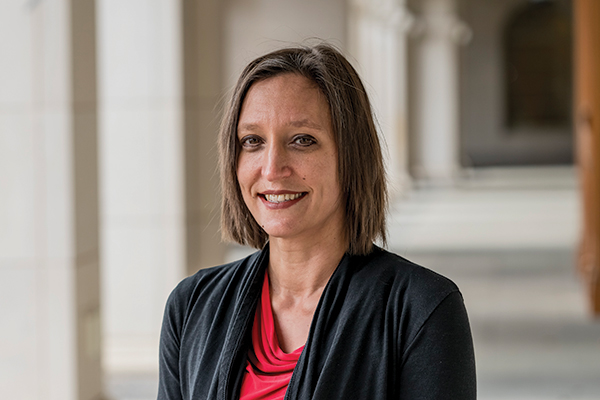Our essential staff member: Megan Flake

As McKelvey Engineering’s laboratory safety & protocol manager, Megan Flake, who has seemingly limitless energy and passion for her job, is responsible to ensure everything runs smoothly and safely in the school’s labs. But what happens when all research shuts down due to a global pandemic?
“Our buildings are living beings,” Flake said. “We have cells that are alive and equipment that needs to be maintained. There were a lot of things that needed to continue to happen.”
For the first few months of the shutdown, Flake was part of a skeleton crew with Gena Reed, payroll coordinator & finance/facilities assistant, and Barbara Semar, who had recently been hired as lab manager for the Department of Mechanical Engineering & Materials Science. Flake and Semar took turns walking through every Engineering lab daily, following a checklist of things specific to each lab they needed to keep their eyes on, including incubators, freezers, refrigerators and chemical supplies. Their goal was to keep each lab in a state that it could restart without significant delay.
McKelvey Engineering labs run around the clock, which means they are in constant need of replenishing supplies. With most of the labs closed, Flake set up a central receiving site at the Brauer Hall loading dock where all supplies would be delivered, sorted and either stored or picked up by the labs still open. Several faculty in the departments of Biomedical Engineering and of Energy, Environmental & Chemical Engineering were in their labs working directly on COVID-19-based research. Ruth Okamoto, teaching professor, and Charlotte Guertler, associate director, were in the Spartan Light Metal Products Makerspace in the Henry A. and Elvira G. Jubel Hall making face shields for health care providers at Washington University Medical Center. Flake also drove materials to the School of Medicine and back.
“We had to add all of this to the things we do for normal lab safety,” Flake said. “In early summer, we started to help all of the faculty develop ramp-up plans for when the labs reopened. We were trying to determine how to keep people safe in an environment in which we needed to have a widespread expectation of compliance, so we wanted to have as much standardization as we could.”
While Flake has been managing labs in the school since 2007, previously managing labs of two former faculty members is biomedical engineering, she never expected to be managing labs during a global pandemic.
“I think this mostly fell to my position because of my background in research and the existing relationships I have with our research faculty and graduate students,” said Flake, who earned a bachelor’s degree in biology with a minor in chemistry from Fontbonne University. “Safety is already an overarching part of my job, and I have an intimate knowledge of what happens in our labs on a daily basis, so that put this in my wheelhouse.”
Flake said faculty have been very patient and understanding about the changes.
“I feel very fortunate to be working in Engineering in particular — I don’t have to sell the science,” Flake said.
“Everyone gets it, and we’ve made a conscious decision to make science-based decisions. With the support of the infectious disease specialists at the medical school and the Environmental Health and Safety department, we have been able to respond unbelievably quickly to changing conditions because of the team we have here at the university.”
“As we restarted our research activities in earnest last summer, the McKelvey COVID response team was discussing the new laboratory protocols and how we would manage them,” said Aaron Bobick, dean and James M. McKelvey Professor. “As we considered everything we were doing, I think one of our department chairs summed it up the best: ‘Thank god for Megan Flake.’” Bobick added: “Amen to that.”
Back to Engineering Momentum